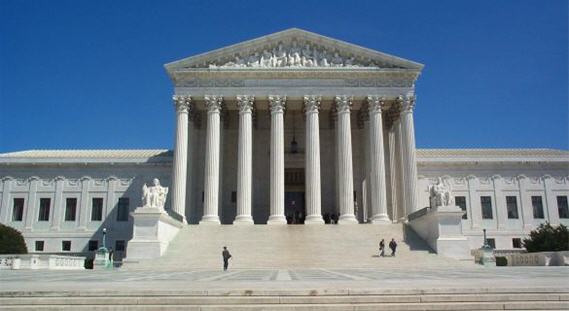A Note on Switching Votes on the SCOTUS
If Roberts did switch his vote, it should not be considered odd.
James Joyner has a post up that explores speculation about whether Chief Justice Roberts switched his vote in NFIB v. Sebelius. Without a doubt, this makes for some interesting speculation. However, I would note that, at least in theory, this should not be considered odd.
The way the Court works is as follows:
1. The Justices meet after oral arguments and cast an initial vote and then someone in the majority is assigned the task of drafting the majority opinion. This is not a binding vote, and nor is the Court committed to adopting the opinion assigned.
2. The Justices disperse and go off and work on their own with their clerks. The Justices in the minority can draft dissenting opinions, and those in majority can draft concurring ones.
3. In theory, as the written documents are circulated, Justices can change their votes. Therefore, this means that either one of the draft dissenting opinions (or, at least, its logic) could become a majority opinion. Or, for that matter, one of the concurring opinions may be adopted as the majority opinion in place of the one that had been assigned.
So, perhaps this is what we are seeing here—that Roberts was persuaded by other member of the Court, or simply changed his mind after having time to contemplate the issue. Indeed, the time to think and the opportunity for actual debate and argument to take place (albeit mostly in written form) is one of the things that should make the Supreme Court a rather different than, say, the Congress. In fact, as a general rule, partisan politicians are not allowed to change their minds once they have made public statements (flip-floppers!) but it is interesting to consider that Supreme Court Justices might actually be allowed to change their minds because of thought, research, or persuasion.






I think it’s quite plausible. Most of the Justices are extremely predictable ideologically but they are at least intellectual creatures subject to new information and arguments. And Roberts’ additional role as guardian of the judiciary as an institution doubtless influences his view of cases.
There’s a quote I read long ago that I wish I had clipped. The reporter asked a Justice about politics in the Supreme court, to which the Justice replied “we don’t play politics here” (or something to that effect). So the reporter asked his ideological opposite, who said the same thing.
I must be nice to be able to disagree on things because of PoV and know that you’re … just doing your job.
Still looking for a silver lining in the ObamaCare decision ?
Given that the SCOTUS declared a monetary “penalty” to be a tax, I guess now I can deduct traffic and parking tickets under “Taxes other.”
Got fined by the EPA, FTC, FCC, SEC … deduct it .. they are now taxes
Got a penalty for early withdraw of 401(k) funds … deduct it .. they are now taxes